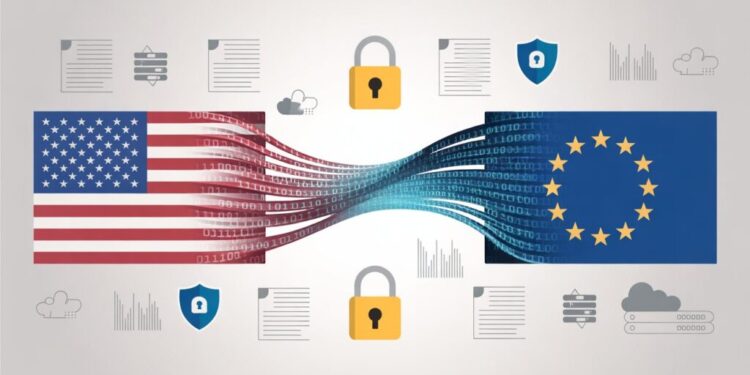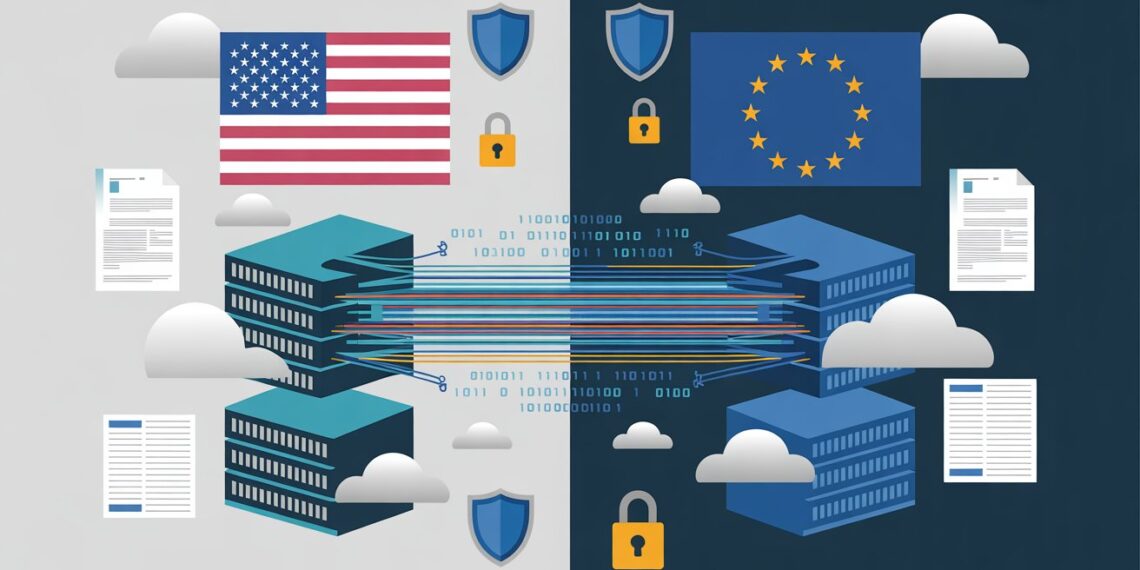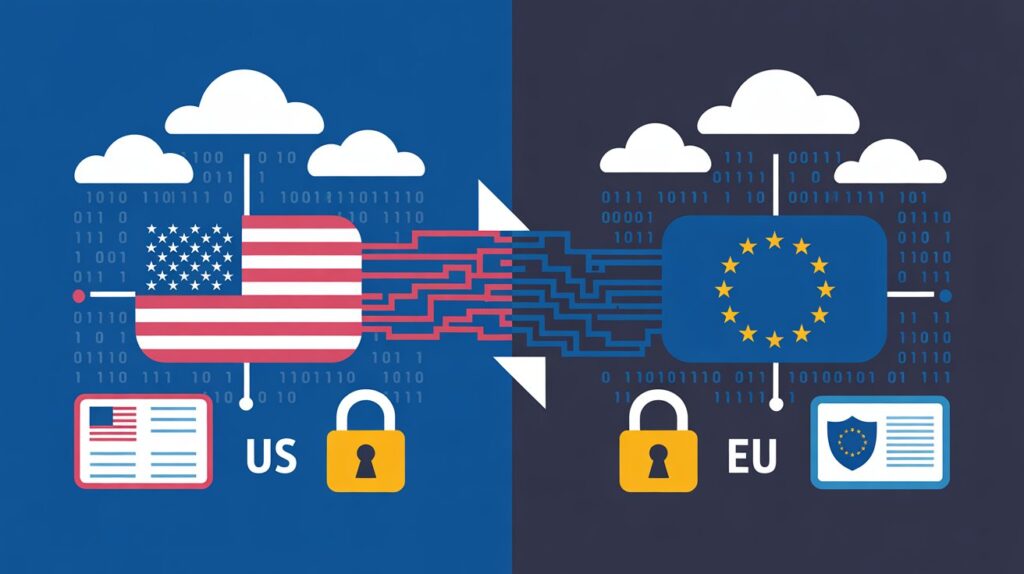In today’s data-driven world, personal information has become one of the most valuable assets for businesses—and one of the most regulated. As concerns about privacy and digital surveillance continue to grow, understanding Data Privacy Laws in the US vs. EU has become critical for organizations operating internationally.
Both regions recognize the importance of protecting user data, but their approaches differ significantly. While the European Union (EU) follows a unified and comprehensive framework under the General Data Protection Regulation (GDPR), the United States (US) uses a sectoral approach, with separate laws governing specific industries and states.
This article breaks down the key differences between US and EU data privacy laws, their impact on businesses and individuals, and what compliance means in 2025.
Understanding the Foundations of Data Privacy Laws
The Rise of Global Privacy Awareness
The massive growth of the internet, social media, e-commerce, and big data analytics has made personal information a global currency. Yet, with that growth came security breaches, data misuse, and a demand for stronger privacy protections.
In response, the EU took a proactive stance by enacting the GDPR in 2018, setting global benchmarks for privacy regulation. The US, on the other hand, has relied on a more fragmented structure of federal and state laws, each addressing different sectors or privacy concerns.
Overview of Data Privacy in the European Union (EU)
1. The General Data Protection Regulation (GDPR)
The GDPR is the cornerstone of EU data privacy. It applies to all EU member states and governs how personal data is collected, processed, stored, and shared. Importantly, it also applies to organizations outside the EU that handle the data of EU residents.
Key Principles of GDPR:
-
Lawfulness, fairness, and transparency: Data must be processed legally and with clear communication.
-
Purpose limitation: Information should only be used for the reason it was collected.
-
Data minimization: Only necessary data should be collected.
-
Accuracy: Data must be kept up-to-date.
-
Storage limitation: Data should not be stored longer than needed.
-
Integrity and confidentiality: Proper security measures must protect data.
2. Rights of Individuals Under GDPR
The GDPR grants EU citizens strong rights over their data, including:
-
The right to access personal data.
-
The right to correct or delete data (“right to be forgotten”).
-
The right to restrict or object to processing.
-
The right to data portability.
-
The right to be informed about data use.
3. Enforcement and Penalties
GDPR violations can lead to significant financial penalties—up to €20 million or 4% of a company’s global annual turnover, whichever is higher. Regulators also have the power to restrict data processing or ban transfers.
Overview of Data Privacy in the United States (US)
1. Fragmented Legal Framework
Unlike the EU’s centralized approach, the US has no single, comprehensive data protection law. Instead, it relies on:
-
Federal laws that regulate specific industries.
-
State-level laws that apply locally.
-
Sector-specific agencies that oversee compliance.
2. Key Federal Privacy Laws
-
Health Insurance Portability and Accountability Act (HIPAA): Protects health-related data.
-
Gramm-Leach-Bliley Act (GLBA): Governs financial institutions’ data security.
-
Children’s Online Privacy Protection Act (COPPA): Regulates data collection from children under 13.
-
Federal Trade Commission Act (FTC Act): Prohibits unfair or deceptive practices related to consumer data.
3. Emerging State-Level Privacy Laws
In the absence of a federal equivalent to GDPR, several states have developed their own privacy regulations:
-
California Consumer Privacy Act (CCPA) and California Privacy Rights Act (CPRA)—the most comprehensive US privacy laws, granting Californians the right to know, delete, and opt out of data sharing.
-
Virginia Consumer Data Protection Act (VCDPA) and Colorado Privacy Act (CPA)—which follow similar models, focusing on consumer control and business accountability.
These laws collectively mark the beginning of a state-driven privacy movement across the US.
Key Differences: Data Privacy Laws in the US vs. EU
1. Regulatory Approach
Aspect |
EU (GDPR) |
US |
|---|---|---|
Structure |
Comprehensive, unified regulation |
Fragmented, sector-based approach |
Scope |
Applies to all personal data |
Varies by sector or state |
Governing Body |
EU Data Protection Authorities |
Multiple federal and state agencies |
Focus |
Fundamental right to privacy |
Consumer protection and commerce |
2. Consent and Legal Basis
Under GDPR, organizations must have a lawful basis—such as consent, contract, or legitimate interest—to process personal data. In contrast, the US generally allows data collection by default unless restricted by specific laws, emphasizing opt-out mechanisms rather than opt-in consent.
3. Enforcement and Penalties
EU regulators enforce GDPR strictly with substantial fines. The US relies more on civil penalties and enforcement by the Federal Trade Commission (FTC) or state attorneys general.
4. Individual Rights
The GDPR grants individuals expansive rights, including access, erasure, and objection. US laws offer fewer rights overall, though some state laws like the CPRA are beginning to close this gap.
5. Cross-Border Data Transfers
The EU restricts data transfers to countries without “adequate” data protection standards. The US–EU Privacy Shield Framework was invalidated in 2020 (Schrems II case), but updated mechanisms like the EU-US Data Privacy Framework (2023) now aim to restore compliant transfers.
How These Differences Impact Businesses
1. Compliance Complexity
For multinational companies, compliance can be challenging. A business serving both US and EU customers must:
-
Align with GDPR’s stringent consent and transparency rules.
-
Adapt to US state laws like CCPA/CPRA, which differ in terminology and obligations.
2. Data Transfer Challenges
Organizations transferring data between regions must ensure legal mechanisms, such as Standard Contractual Clauses (SCCs) or Binding Corporate Rules (BCRs), are in place.
3. Increased Cost of Compliance
Building compliance programs, training staff, updating privacy notices, and implementing security controls require substantial resources—but non-compliance costs more in the long run.
4. Consumer Trust and Reputation
Strong data privacy practices improve consumer trust. In contrast, breaches or violations not only bring penalties but also long-term reputational damage.
The Future of Data Privacy Laws in 2025 and Beyond
1. Convergence Toward Global Standards
As more countries adopt GDPR-inspired regulations, the gap between US and EU frameworks is narrowing. Several US proposals—such as the American Data Privacy and Protection Act (ADPPA)—seek to create a federal baseline for privacy rights.
2. Technology’s Role in Privacy
Artificial intelligence, data analytics, and IoT have created new challenges for privacy regulation. Expect updates to both US and EU laws to address automated decision-making, algorithmic transparency, and AI ethics.
3. Stricter Enforcement
EU regulators continue to increase cross-border cooperation for enforcement, while US agencies are becoming more active, especially against deceptive data collection practices.
4. Rising Demand for Data Ethics
Beyond legal compliance, organizations are expected to follow ethical data use principles—prioritizing transparency, fairness, and accountability.
Practical Compliance Checklist for Businesses
To manage the complex landscape of Data Privacy Laws in the US vs. EU, businesses should:
-
Map data flows: Understand what personal data is collected, where it’s stored, and how it moves across systems.
-
Establish lawful bases: Ensure every processing activity has a valid legal justification.
-
Review privacy policies: Make them transparent, concise, and compliant with both GDPR and state laws.
-
Implement data subject request procedures: Enable users to access, delete, or correct their data efficiently.
-
Secure data transfers: Use approved transfer mechanisms like SCCs.
-
Train employees: Educate staff on privacy responsibilities and best practices.
-
Document compliance: Maintain records for audits and regulatory inspections.
Common Myths About Data Privacy Laws
Myth 1: “GDPR doesn’t apply to US companies.”
False. Any company that processes EU residents’ data—regardless of location—must comply with GDPR.
Myth 2: “US state laws only affect large corporations.”
Not entirely. Some states exempt small businesses, but others include thresholds based on revenue or data volume. Compliance obligations are expanding quickly.
Myth 3: “Data privacy is only about IT security.”
Privacy includes not just security but also transparency, user control, and ethical handling of data.
FAQs
1. What is the main difference between data privacy laws in the US and EU?
The EU uses a comprehensive, rights-based approach under GDPR, while the US applies a sectoral, business-focused system with state variations.
2. Do US companies need to comply with GDPR?
Yes. If they process or monitor data from EU residents, GDPR applies regardless of where the company is located.
3. What are the penalties for violating GDPR?
Fines can reach up to €20 million or 4% of global annual turnover, whichever is higher.
4. How does the CCPA compare to GDPR?
CCPA grants rights to California residents similar to GDPR, such as the right to know and delete data, but enforcement and scope are narrower.
5. How can companies legally transfer data from the EU to the US?
Businesses can use Standard Contractual Clauses, Binding Corporate Rules, or the EU–US Data Privacy Framework.
6. Are new US federal privacy laws expected?
Yes. Several proposals aim to create a national privacy framework, though none have passed yet.
Conclusion
Understanding Data Privacy Laws in the US vs. EU is no longer optional—it’s essential for any business that handles personal data across borders. While the EU offers a unified and rights-focused model through the GDPR, the US remains a patchwork of federal and state-level rules emphasizing consumer protection.
For organizations, compliance means more than avoiding fines—it’s about building trust, transparency, and long-term credibility with customers. As technology continues to evolve, staying informed and proactive about privacy obligations will remain a defining factor for success in the digital economy.






